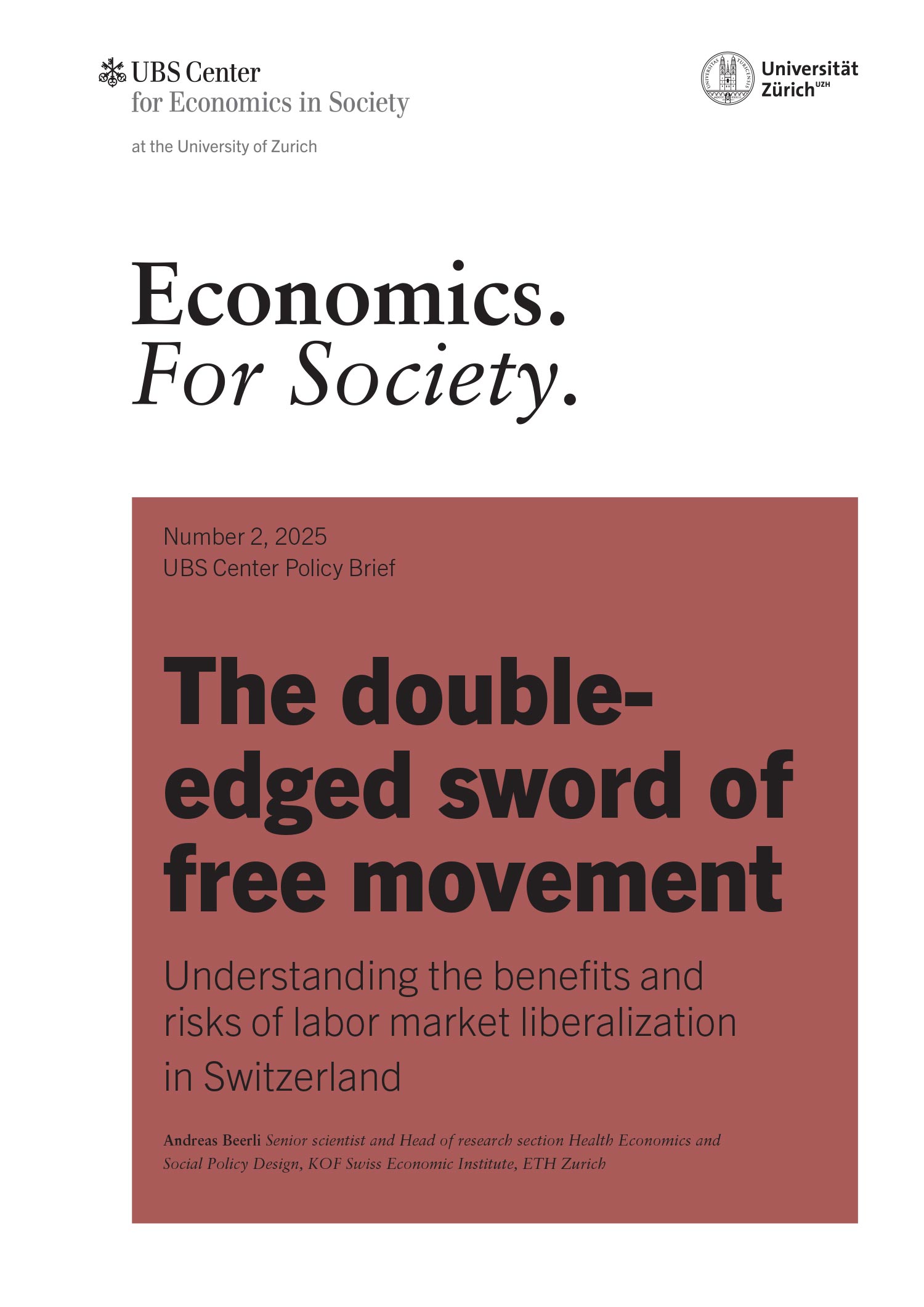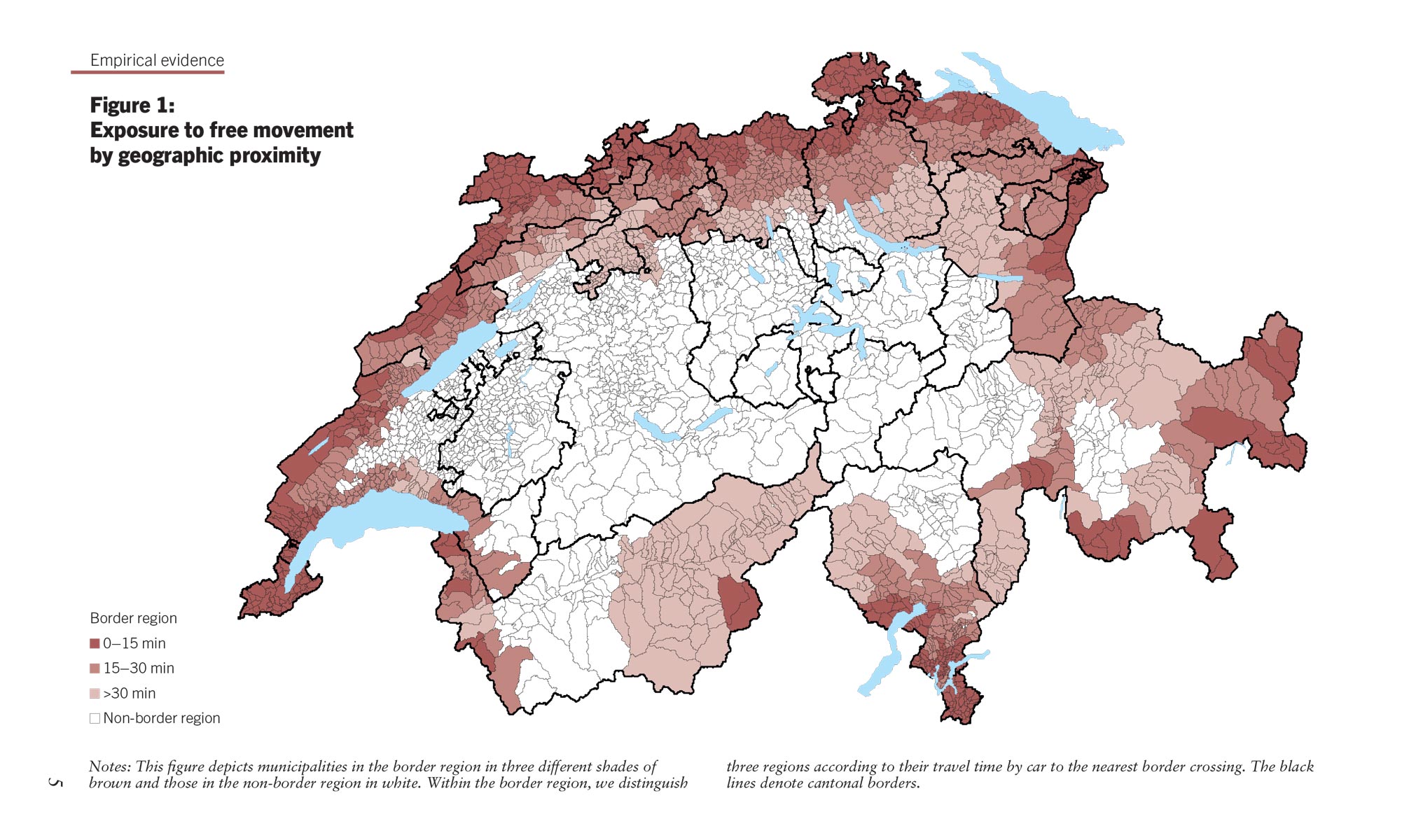2
In a nutshell
As Switzerland and the European Union engage in renewed negotiations over a comprehensive framework agreement, the principle of free movement of persons remains a pivotal and contentious issue. While the agreement promises enhanced access to EU programs and markets, concerns persist about potential strains on infrastructure, wage pressures, and national sovereignty. Recent research by Andreas Beerli and colleagues provides timely insights into these debates. Their studies reveal that liberalizing labor market access can lead to strong inflows of immigrants followed by firm growth and productivity gains – without negative effects on the labor market overall. However, they also highlight that such immigration flows may be accompanied by increased support for anti-immigration parties, driven more by political narratives than by direct economic or cultural threats. These findings underscore the importance of balancing economic openness with proactive investments into public infrastructure and housing, as well as informed public discourse.
As Switzerland and the European Union engage in renewed negotiations over a comprehensive framework agreement, the principle of free movement of persons remains a pivotal and contentious issue. While the agreement promises enhanced access to EU programs and markets, concerns persist about potential strains on infrastructure, wage pressures, and national sovereignty. Recent research by Andreas Beerli and colleagues provides timely insights into these debates. Their studies reveal that liberalizing labor market access can lead to strong inflows of immigrants followed by firm growth and productivity gains – without negative effects on the labor market overall. However, they also highlight that such immigration flows may be accompanied by increased support for anti-immigration parties, driven more by political narratives than by direct economic or cultural threats. These findings underscore the importance of balancing economic openness with proactive investments into public infrastructure and housing, as well as informed public discourse.

Opportunities for action
1
For the economy to maintain strong firm growth, higher employment, increased labor productivity, and expanded innovation activity, the free movement of labor remains essential.
2
Migration policy outcomes cannot be assessed solely through economic data. Even objectively positive labor market effects can be politically destabilized if public narratives turn negative. These must be addressed as such.
3
Realizing the economic benefits of immigration requires parallel investments in local public services – such as education, housing, and transport – alongside communication strategies that counter fear-based narratives.
1
For the economy to maintain strong firm growth, higher employment, increased labor productivity, and expanded innovation activity, the free movement of labor remains essential.
2
Migration policy outcomes cannot be assessed solely through economic data. Even objectively positive labor market effects can be politically destabilized if public narratives turn negative. These must be addressed as such.

Conclusion
Taken together, these studies paint a complex but coherent picture of labor market openness. Removing barriers to skilled immigration can boost economic growth and create upward mobility for native workers. However, political acceptance depends on narratives and perceptions, not just economic fundamentals.
In the current political climate, where migration is again at the center of national and European debates, these findings suggest important avenues for policy-makers. Given the complex interplay of actors and influencing factors, economic impacts represent only one part of the equation. A broader perspective that takes into account local capacities and societal dynamics may be needed to support stable policy outcomes in the context of labor mobility.
Finally, further research is needed to understand the long-term dynamics of free movement, particularly regarding the effectiveness of Switzerland’s accompanying measures (“flankierende Massnahmen”) in protecting wage standards, the resilience of local education and healthcare systems under demographic pressures, the role of the housing market, and the broader distributional effects of labor mobility across regions and sectors. In addition, future studies could explore the conditions that made the reform successful: How important was the fact that the liberalization was gradual and predictable, allowing firms and labor markets to adjust over time? And to what extent did accompanying measures – such as wage controls or enforcement mechanisms – help mitigate potential negative effects on native workers? These questions are essential for understanding what it takes to design sustainable labor market openness in the long run.
This UBS Center Policy Brief summarizes evidence presented in the following academic articles.
Taken together, these studies paint a complex but coherent picture of labor market openness. Removing barriers to skilled immigration can boost economic growth and create upward mobility for native workers. However, political acceptance depends on narratives and perceptions, not just economic fundamentals.
In the current political climate, where migration is again at the center of national and European debates, these findings suggest important avenues for policy-makers. Given the complex interplay of actors and influencing factors, economic impacts represent only one part of the equation. A broader perspective that takes into account local capacities and societal dynamics may be needed to support stable policy outcomes in the context of labor mobility.

Literature
Beerli, A., Ruffner, J., Siegenthaler, M., & Peri, G. (2021). The Abolition of Immigration Restrictions and the Performance of Firms and Workers: Evidence from Switzerland. American Economic Review.
Alrababah, A., Beerli, A., Hangartner, D., & Ward, D. (2024). The Free Movement of People and the Success of Far-Right Parties: Evidence from Switzerland’s Border Liberalization. American Political Science Review.
Callouts
Further reading
Ariu, A. (2022). Foreign workers, product quality, and trade: Evidence from a natural experiment. Journal of International Economics, 139, 103686.
Bächli, M., & Tsankova, T. (2023). Free movement of workers and native demand for tertiary education. Journal of Human Resources.
Beerli, A., Indergand, R., & Kunz, J. S. (2023). The Supply of Foreign Talent. How skill-biased Technology Drives the Location Choice and Skills of New Immigrants. Journal of Population Economics, 36, 681–718.
Cristelli, G., & Lissoni, F. (2020, forthcoming JEEA). Free movement of inventors: open-border policy and innovation in Switzerland.
Docquier, F., & Rapoport, H. (2012). Globalization, Brain Drain, and Development. Journal of Economic Literature, vol. 50, no. 3.
Efferson, C., Lalive, R., & Fehr, E. (2008). The Coevolution of Cultural Groups and Ingroup Favoritism. Science, vol. 321, issue 5897.
Author
Andreas Beerli is an economist studying immigration, (digital) labor markets, and public policy more generally. He heads the research section Health Economics and Social Policy Design at KOF Economic Institute (ETH Zurich). Andreas Beerli is also a research affiliate at the Immigration Policy Lab, at the Institute of Labor Economics (IZA), and at the Zurich Center for Neuroeconomics (UZH). He has a PhD from the Department of Economics at the University of Zurich. Andreas Beerli collaborates regularly with private and public organizations to evaluate and improve the impact of public policies and social programs. Most of his work uses causal research designs such as randomized evaluations applied to large, linked administrative datasets. He also conducts tailored surveys to shed light on project-specific psychological factors.
Andreas Beerli is an economist studying immigration, (digital) labor markets, and public policy more generally. He heads the research section Health Economics and Social Policy Design at KOF Economic Institute (ETH Zurich). Andreas Beerli is also a research affiliate at the Immigration Policy Lab, at the Institute of Labor Economics (IZA), and at the Zurich Center for Neuroeconomics (UZH). He has a PhD from the Department of Economics at the University of Zurich. Andreas Beerli collaborates regularly with private and public organizations to evaluate and improve the impact of public policies and social programs. Most of his work uses causal research designs such as randomized evaluations applied to large, linked administrative datasets. He also conducts tailored surveys to shed light on project-specific psychological factors.